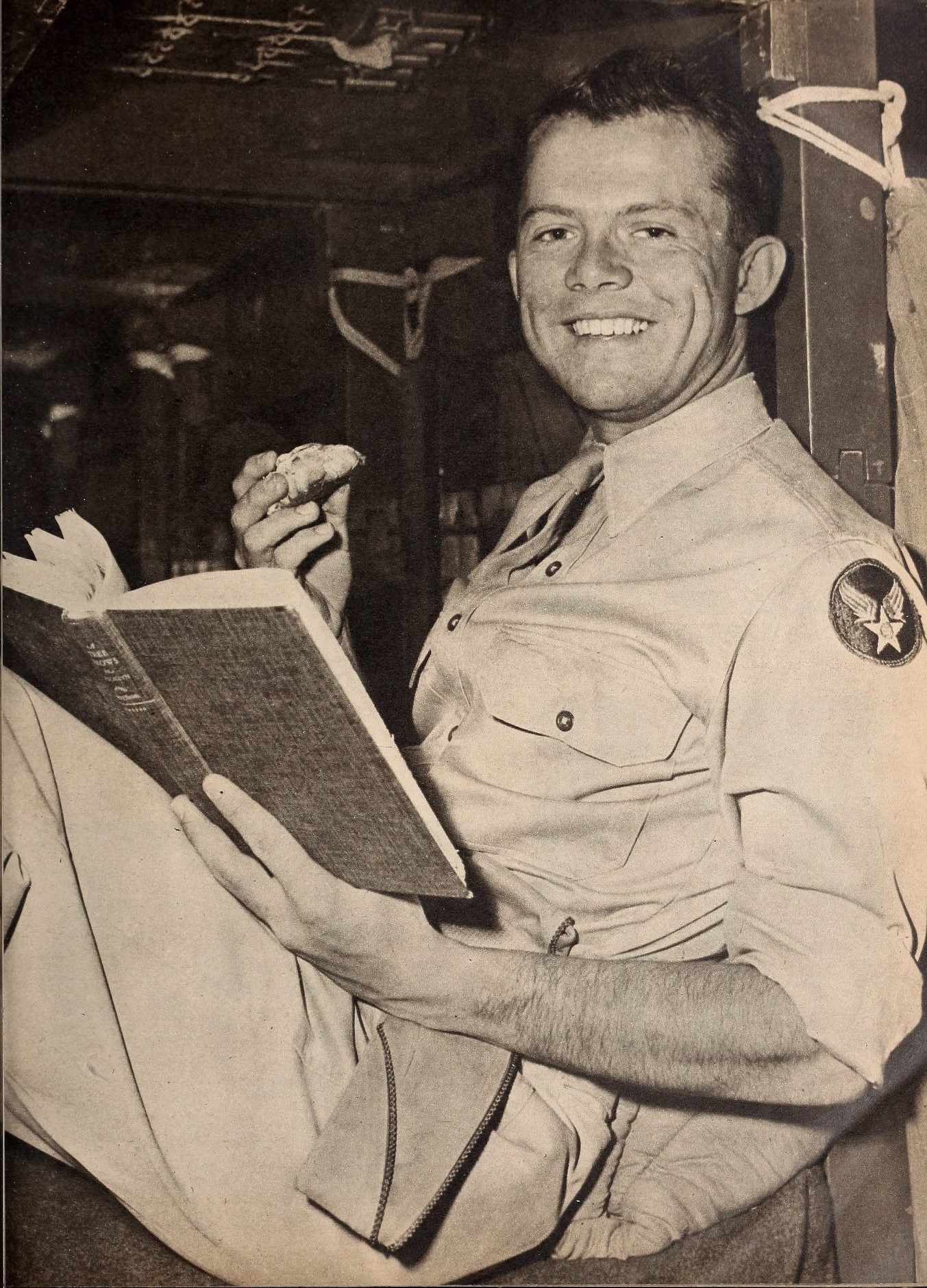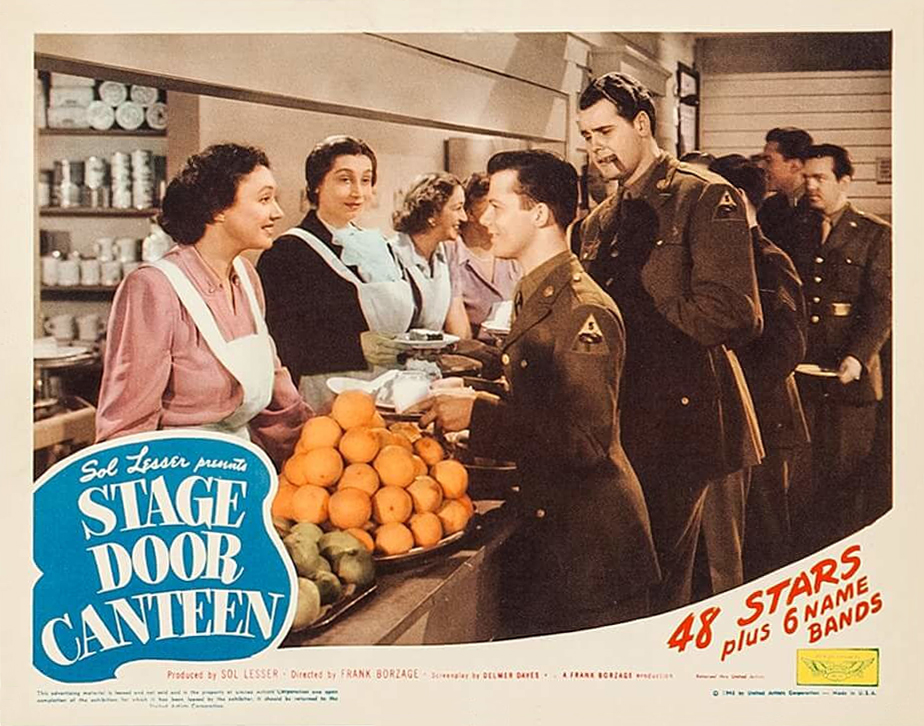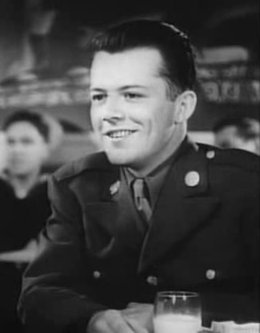1. Overview
Herbert Alonzo "Lon" McCallister Jr. (April 17, 1923 - June 11, 2005) was an American actor known for his portrayal of gentle, boyish young men from the countryside. His career, spanning from uncredited early appearances to starring roles, often saw him in roles that capitalized on his ingenuous appeal, making him a favorite among family audiences, particularly in outdoor settings featuring animals. This article details McCallister's life from his early beginnings and education, through his acting career on film and television, to his eventual retirement and successful ventures in real estate, concluding with an examination of his personal life, death, and lasting legacy.
2. Early life and background
Lon McCallister was born on April 17, 1923, in Los Angeles, California. His father worked as a real estate broker. His early life was marked by his introduction to the entertainment industry at a young age, indicating a family environment supportive of or involved in show business.
2.1. Childhood and education
McCallister attended the Marken Professional School, an institution specifically designed to train children for careers in show business. He began his acting career at the age of 13, directly following his preparation at such professional institutions.
3. Acting career
Lon McCallister's acting career began in the mid-1930s and saw him transition from numerous uncredited minor roles to leading parts in films, and later, extensive work in television. His youthful appearance and slight stature significantly influenced the types of roles he was offered throughout his career.

3.1. Early roles and uncredited appearances
McCallister started his acting journey with many uncredited appearances in films beginning in 1936. His debut on screen included a minor role in Let's Sing Again (1936) and a small part in Romeo and Juliet (1936), where director George Cukor notably gave him a large close-up and later became his friend.
His numerous uncredited roles continued throughout the late 1930s and early 1940s, including:
- Stella Dallas (1937)
- Souls at Sea (1937)
- Make a Wish (1937)
- The Adventures of Tom Sawyer (1938)
- Judge Hardy's Children (1938)
- Lord Jeff (1938)
- That Certain Age (1938)
- Little Tough Guys in Society (1939)
- The Spirit of Culver (1939)
- Confessions of a Nazi Spy (1939)
- Babes in Arms (1939)
- First Love (1939)
- Joe and Ethel Turp Call on the President (1939)
- Susan and God (1940)
- Henry Aldrich for President (1941)
- Dangerously They Live (1941)
- Always in My Heart (1942)
- Yankee Doodle Dandy (1942)
- Spy Ship (1942)
- Night in New Orleans (1942)
- That Other Woman (1942)
- Gentleman Jim (1942)
- Quiet Please: Murder (1942)
- Over My Dead Body (1942)
- The Hard Way (1943)
- The Meanest Man in the World (1943)
During this period, influential columnist Hedda Hopper praised him, calling him "the cutest boy the movies have hauled up out of obscurity since Mickey Rooney."
3.2. Rise to stardom
McCallister's career gained significant momentum in the mid-1940s. At the age of 20, he appeared in the 1943 World War II morale-boosting film Stage Door Canteen. In the film, he played California Jack Gilman, a star-struck serviceman who interacts with renowned theater actress and producer Katharine Cornell. His performance was highly praised, with the Los Angeles Times noting that he "stole the film with his bashful smile and winning ways."

His breakout role came as Sparke in the 1944 horse-racing tale Home in Indiana, where he starred alongside established actors Walter Brennan and Jeanne Crain. This success led to him securing a contract with 20th Century Fox. He followed this with another notable role as Francis William 'Frankie' Davis in Winged Victory (1944). However, the momentum of his burgeoning career was temporarily interrupted by his service during the war.

Despite his early successes, McCallister's physical stature, growing only to 5 in, later became a significant handicap in finding more mature adult roles. Nevertheless, he continued to land substantial parts. In 1947, he appeared with veteran actor Edward G. Robinson in The Red House (playing Nath Storm) and took on a starring role as David MacAdam in Thunder in the Valley (1947). He also supported June Haver as Daniel 'Snug' Dominy in Scudda Hoo! Scudda Hay! (1948). He took the lead in another animal-themed story, The Big Cat (1949), playing Danny Turner, and co-starred with Shirley Temple as Ted Knowles in The Story of Seabiscuit (1949). His last film in this period was The Boy from Indiana (1950), where he played Lon Decker.
3.3. Later film and television career
As the 1950s began, McCallister expanded his presence into the burgeoning medium of television, making appearances in various series and shows. He featured in episodes of Suspense, playing roles in "Lunch Box" and "Collector's Item," and in Lux Video Theatre in an episode titled "Down Bayou DuBac."
He also continued to work in feature films, taking the lead role as Andy Smith in Sam Katzman's production A Yank in Korea (1951). He then appeared in the Western film Montana Territory (1952) as John Malvin. His final feature film role was as Martin in Combat Squad (1953). However, television became his primary platform, and he was frequently seen in:
- Tales of Tomorrow, in episodes such as "Verdict from Space," "The Last Man on Earth," and "Enemy Unknown."
- The Ford Television Theatre, in the episode "My Daughter's Husband."
- Schlitz Playhouse, in the episode "Operation Riviera."
- Footlights Theater, also in "My Daughter's Husband."
3.4. Other professional ventures
Beyond his acting roles, Lon McCallister ventured into production. He and fellow actor William Eythe co-produced the stage musical revue Lend an Ear. This production notably premiered at the Las Palmas Theater in Los Angeles and played a significant role in launching the career of future Broadway legend Carol Channing.
4. Post-acting career and later life
McCallister made a definitive shift away from the acting world in the early 1950s, embarking on a new and successful career path outside of Hollywood.
4.1. Retirement and real estate
In 1953, at the relatively young age of 30, Lon McCallister decided to retire from acting. Following his departure from the film and television industry, he transitioned into real estate management. In this new profession, he achieved considerable success and built substantial wealth through his investments.
4.2. Later acting appearances
After his retirement from full-time acting in 1953, McCallister made two brief returns to television. He appeared as Coley Wilks in "The Hostage," a 1961 episode of the ABC western series, The Rebel, starring Nick Adams. He also played Willie in "Triple Indemnity," a 1963 episode of the CBS sitcom, The New Phil Silvers Show.
4.3. Reflections on his career
McCallister openly shared his perspective on his acting career and his life after retirement. In 1963, he expressed contentment with his choices, stating, "I'm happy. I'm doing what I want." Decades later, in a 1992 interview, he further elaborated on his feelings about his past profession, remarking, "Being a movie star was great, but I never considered doing it for a lifetime. I wanted to be myself, to go where I pleased without causing a traffic jam. I've succeeded in this, and I'm happy." These statements highlight his deliberate decision to leave the limelight and his satisfaction with a more private, self-directed life.
5. Personal life
Lon McCallister was in a long-term romantic partnership with fellow actor William Eythe. Their relationship continued until Eythe's death in 1957.
6. Death
Lon McCallister passed away on June 11, 2005, at the age of 82. He died in Lake Tahoe, California. The cause of his death was congestive heart failure.
7. Legacy and reception
Lon McCallister's career was marked by his distinctive screen persona, often characterized as "the perpetual boy." Critics noted his "ingenuous appeal" that made him a favorite among family audiences. He was particularly adept at portraying characters in outdoor settings, often alongside animals like dogs and horses. However, his enduring boyishness and slight physical stature, which stood at about 66 in (168 cm), ultimately became a limitation. While initially a charming trait, it hindered his ability to secure more mature and diverse roles as he aged, confining him to a narrow range of characters in the latter part of his acting career.
8. Filmography
| Year | Title | Role | Notes |
|---|---|---|---|
| 1936 | Let's Sing Again | Orphan | Uncredited |
| Romeo and Juliet | Minor Role | Uncredited | |
| 1937 | Stella Dallas | Boy | Uncredited |
| Souls at Sea | Cabin Boy | Uncredited | |
| Make a Wish | Summer Camp Kid | Uncredited | |
| 1938 | The Adventures of Tom Sawyer | Schoolboy | Uncredited |
| Judge Hardy's Children | Uncredited | ||
| Lord Jeff | Uncredited | ||
| That Certain Age | Billy | Uncredited | |
| Little Tough Guys in Society | Uncredited | ||
| 1939 | The Spirit of Culver | Cadet | Uncredited |
| Confessions of a Nazi Spy | Uncredited | ||
| Babes in Arms | Boy | Uncredited | |
| First Love | Boy at School | Uncredited | |
| Joe and Ethel Turp Call on the President | Johnny | Uncredited | |
| 1940 | Susan and God | Party Guest | Uncredited |
| 1941 | Henry Aldrich for President | Student | Uncredited |
| Dangerously They Live | Newsboy | Uncredited | |
| 1942 | Always in My Heart | Boy | Uncredited |
| Yankee Doodle Dandy | Call Boy | Uncredited | |
| Spy Ship | Telegram Messenger Boy | Uncredited | |
| Night in New Orleans | Boy in Car | Uncredited | |
| That Other Woman | George Borden | ||
| Gentleman Jim | Page Boy | Uncredited | |
| Quiet Please, Murder | Freddie, the Stack Boy | Uncredited | |
| Over My Dead Body | Jimmie | ||
| 1943 | The Hard Way | Bud - Call Boy in Montage | Uncredited |
| The Meanest Man in the World | Bellboy | Uncredited | |
| Stage Door Canteen | California Jack Gilman | ||
| 1944 | Home in Indiana | 'Sparke' Thornton | |
| Winged Victory | Francis William 'Frankie' Davis | ||
| 1947 | The Red House | Nath Storm | |
| Thunder in the Valley | David MacAdam | ||
| 1948 | Scudda Hoo! Scudda Hay! | Daniel 'Snug' Dominy | |
| 1949 | The Big Cat | Danny Turner | |
| The Story of Seabiscuit | Ted Knowles | ||
| 1950 | The Boy from Indiana | Lon Decker | |
| 1951 | A Yank in Korea | Andy Smith | |
| 1952 | Montana Territory | John Malvin | |
| 1953 | Combat Squad | Martin |